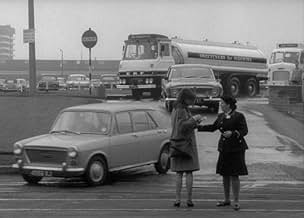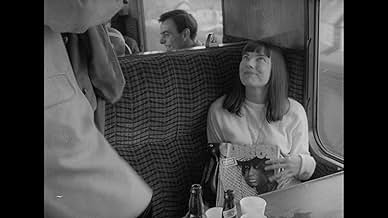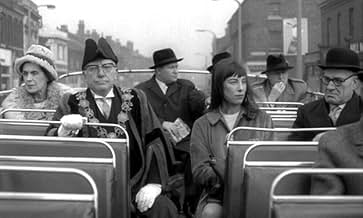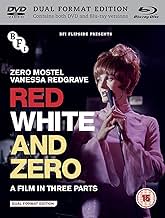An impassive young girl is taken from her suicidal big-city life back to a city in the North of England on a bizarre bus trip. Seen through the poetic eye of the camera, this is a commentary... Read allAn impassive young girl is taken from her suicidal big-city life back to a city in the North of England on a bizarre bus trip. Seen through the poetic eye of the camera, this is a commentary of doomed British morbidity.An impassive young girl is taken from her suicidal big-city life back to a city in the North of England on a bizarre bus trip. Seen through the poetic eye of the camera, this is a commentary of doomed British morbidity.
Allan O'Keefe
- Supporter
- (as Alan O'Keefe)
Dennis Alaba Peters
- Mr. Wombe
- (as Alaba Peters)
Featured reviews
This review is for Red, White and Zero. It's possible to reconstruct the facts around this film, but the IMDb listing is confusing. Lindsay Anderson's The White Bus was briefly and unsuccessfully released with two other shorts: a very short film by Peter Brook featuring Zero Mostel in a hurry (The Ride of the Valkyries - lots of frantic mugging), and Red and Blue by Tony Richardson. Only Lindsay Anderson's film seems to be readily available. (The others would make good Criterion extras.)
I saw Red, White and Zero on late night Australian television in 1984. The White Bus wasn't seen to best effect on the small screen - rather self-consciously poetic, but as an Anderson film it will obviously bear reseeing. Red and Blue was fascinating and not very good. Tony Richardson was in love with the Nouvelle Vague, and raided its box of tricks and its composers (Bassiak from Jules and Jim; Duhamel from Godard's Pierrot le Fou) in an imitation Demy/Moreau vehicle for Vanessa Redgrave! She fluted a song in English, and Kevin Brownlow provided the jumpcuts. (You can hear her singing Bassiak's Bonjour Papa on YouTube).
Most weirdly, the sex interests for the romantically-besieged Vanessa were provided by Douglas Fairbanks Jr, William Sylvester (the scientist from Kubrick's 2001), and Michael York. The sparks didn't exactly fly. Anyway, after 30 years, it's time to make this available again.
I saw Red, White and Zero on late night Australian television in 1984. The White Bus wasn't seen to best effect on the small screen - rather self-consciously poetic, but as an Anderson film it will obviously bear reseeing. Red and Blue was fascinating and not very good. Tony Richardson was in love with the Nouvelle Vague, and raided its box of tricks and its composers (Bassiak from Jules and Jim; Duhamel from Godard's Pierrot le Fou) in an imitation Demy/Moreau vehicle for Vanessa Redgrave! She fluted a song in English, and Kevin Brownlow provided the jumpcuts. (You can hear her singing Bassiak's Bonjour Papa on YouTube).
Most weirdly, the sex interests for the romantically-besieged Vanessa were provided by Douglas Fairbanks Jr, William Sylvester (the scientist from Kubrick's 2001), and Michael York. The sparks didn't exactly fly. Anyway, after 30 years, it's time to make this available again.
This is a rather confusing situation in that generally it is held that Red White and Zero was a three part film with the involvement of Peter Brook, Lindsay Anderson and Tony Richardson as directors with only Anderson's White Bus segment being completed. Yet here we have a BFI release claiming discovery of the completed portmanteau film yet there are clearly three senate films complete with individual credits. Be all that as may be the Brook segment featuring Zero Mostel is a very 60s slapstick/surreal effort that barely succeeds and the luscious looking short film featuring Vanessa Redgrave (sort of) singing and cavorting about is not terrible but cries out for the participation of Jeanne Moreau, for whom it was originally intended, before Richardson switched ladies. The White Bus remains the most competent and fine looking film displaying the wonders of industrial Manchester in a jokey visitor tour that ironically probably does take place today. As might be expected, as well as the splendid photography we get social comment and politics mixed in with a fondness for the English rural landscape and a humane picture of life of the common man (or woman as rather surprisingly here presented).
The short film, The White Bus, wanted to be an odd film instead turned into a tourist film. Honestly not much happens in the film. I have seen short films with better story lines and character development than the White Bus.
Though it was beautifully filmed.
If you are interested to see a film about Britain in the late 1960's then this film is for you.
Though it was beautifully filmed.
If you are interested to see a film about Britain in the late 1960's then this film is for you.
This film had a big impact on me. Saw first saw it on BBC2 in the 70's as part of a Anderson Retro. Originally based on Delaney's book Red, White & Zero it was a three director/stories feature film. Although the other two parts were never finished. That's why the film doesn't have titles.
The reason why I loved this film was because I grew up in a slum clearance area of Liverpool. The film's landscape was exactly the same. Everything demolished - except for the pubs. I'd never seen anything like it on TV before.
I recently got another chance to see it and loved it. The story follows a girl who is fed up with working in London. The shot opens with her at a desk while the legs of a hanged fellow worker dangle from the celling. She leaves London - tired and fed up - and goes home to Manchester (although parts of the film were filmed in Birmigham). She stands at a desolate bus stop in the middle of demolished terraces. When along comes the white bus - it's a tour guided ride which shows the best of the city. What makes it even more special is that the bus is on it's maiden voyage. The Lord Mayor (Arthur Lowe) and other dignitaries ride the bus on a tour of factories, libraries and even a civil defence demo. At the end of the tour the girl winds up in a small cafe watching, inside what look like married couple. Thier love and passion for the small things in life mesmerises and charms the girl - reminding her what life's all about.
For Delaney it's like Charlie Bubbles - dealing with leaving your home town and looking at the effect it has on you. For Anderson it's yet another example of his cinematic poetry - like If... and Sporting Life. This film is a very special film by very special people. Oh thank you for making it.
The reason why I loved this film was because I grew up in a slum clearance area of Liverpool. The film's landscape was exactly the same. Everything demolished - except for the pubs. I'd never seen anything like it on TV before.
I recently got another chance to see it and loved it. The story follows a girl who is fed up with working in London. The shot opens with her at a desk while the legs of a hanged fellow worker dangle from the celling. She leaves London - tired and fed up - and goes home to Manchester (although parts of the film were filmed in Birmigham). She stands at a desolate bus stop in the middle of demolished terraces. When along comes the white bus - it's a tour guided ride which shows the best of the city. What makes it even more special is that the bus is on it's maiden voyage. The Lord Mayor (Arthur Lowe) and other dignitaries ride the bus on a tour of factories, libraries and even a civil defence demo. At the end of the tour the girl winds up in a small cafe watching, inside what look like married couple. Thier love and passion for the small things in life mesmerises and charms the girl - reminding her what life's all about.
For Delaney it's like Charlie Bubbles - dealing with leaving your home town and looking at the effect it has on you. For Anderson it's yet another example of his cinematic poetry - like If... and Sporting Life. This film is a very special film by very special people. Oh thank you for making it.
Cute, whacky and beautifully shot surrealistic short from Lindsay Anderson which clearly foreshadows if.... which followed a year later (plus O Lucky Man and Brittania Hospital too). The same cinematographer as on if.... plus the mix of black and white and colour shots.
Some key music sound cues from if... feature here for the first time plus the reading of the proverbs quote "wisdom is the principal thing..." which opens if....
There's also a bit of M Hulot's theme from Mon Oncle mixed in there plus some classic Tati-esque visual humor. I guess Mr Anderson had a whole lot of stuff already brewing that would come flowing out in force a little later.
Criterion definitely missed a trick not including this on the if.... DVD/Bluray - a little more relevant than the Oscar winning short about the deaf kids I'd say. All in all a charming, strange and chuckly way to spend forty minutes.
Some key music sound cues from if... feature here for the first time plus the reading of the proverbs quote "wisdom is the principal thing..." which opens if....
There's also a bit of M Hulot's theme from Mon Oncle mixed in there plus some classic Tati-esque visual humor. I guess Mr Anderson had a whole lot of stuff already brewing that would come flowing out in force a little later.
Criterion definitely missed a trick not including this on the if.... DVD/Bluray - a little more relevant than the Oscar winning short about the deaf kids I'd say. All in all a charming, strange and chuckly way to spend forty minutes.
Did you know
- TriviaTheatrical movie debut of Sir Anthony Hopkins (Brechtian).
- ConnectionsFollowed by Red and Blue (1967)
- SoundtracksResolution der Kommunarden
Performed by Anthony Hopkins
Lyrics by Bertolt Brecht / Music by Hanns Eisler
- How long is The White Bus?Powered by Alexa
Details
- Runtime46 minutes
- Color
- Aspect ratio
- 1.37 : 1
Contribute to this page
Suggest an edit or add missing content



























